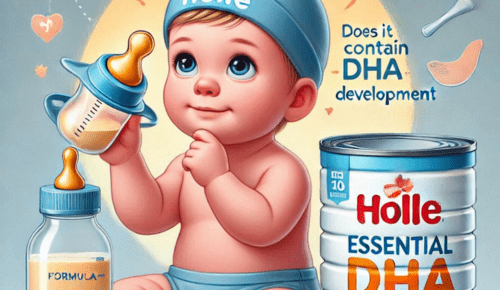The Holle formula is a popular organic baby formula that is made in Germany. It is known for its high-quality ingredients and strict adherence to European Union organic standards. The formula is made from cow’s milk and is suitable for babies from birth onwards. It is available in a variety of stages, including stage 1 for newborns, stage 2 for infants, and stage 3 for older babies. The Holle formula is free from added sugars, GMOs, synthetic preservatives, and artificial flavors and colors. It also contains essential vitamins and minerals that are important for a baby’s growth and development.
The Holle formula is produced using biodynamic farming methods, which prioritize the health of the soil, plants, animals, and humans. This means that the cows that provide the milk for the formula are raised in a natural and sustainable environment, and the ingredients used in the formula are grown without the use of synthetic pesticides or fertilizers. The formula is also free from unnecessary additives and fillers, making it a clean and pure option for parents who want to provide their babies with the best possible nutrition. Overall, the Holle formula is designed to closely mimic the composition of breast milk, making it a popular choice for parents who are unable to breastfeed or supplementing with formula.
Comparing the Holle Formula to Breastfeeding
Breastfeeding is widely recognized as the best source of nutrition for babies, as it provides a unique combination of nutrients, antibodies, and other beneficial components that cannot be replicated in formula. Breast milk is easily digested and contains the perfect balance of proteins, fats, carbohydrates, and other essential nutrients that are crucial for a baby’s growth and development. It also contains antibodies that help protect babies from infections and diseases, as well as hormones that promote bonding between mother and baby.
While breastfeeding is the ideal choice for many families, there are situations where it may not be possible or practical. In these cases, formula feeding can be a suitable alternative. The Holle formula is often compared to breast milk due to its high-quality ingredients and nutritional profile. It is designed to be as close to breast milk as possible, providing babies with the essential nutrients they need to thrive. While it may not be an exact match for breast milk, the Holle formula is a good option for parents who are unable to breastfeed or need to supplement with formula.
Benefits of the Holle Formula
The Holle formula offers several benefits for babies and parents alike. One of the main advantages of the formula is its high-quality ingredients. The formula is made from organic cow’s milk that is produced using biodynamic farming methods, ensuring that it is free from harmful chemicals and additives. This means that parents can feel confident knowing that they are providing their babies with a clean and pure source of nutrition. The formula also contains essential vitamins and minerals that are important for a baby’s growth and development, including vitamin D, calcium, and iron.
Another benefit of the Holle formula is its similarity to breast milk. While it may not be an exact match, the formula is designed to closely mimic the composition of breast milk, providing babies with the nutrients they need to thrive. This can be especially important for babies who are unable to breastfeed or need to supplement with formula. The formula is also easy to prepare and can be a convenient option for parents who are on the go or need to leave their baby with a caregiver. Overall, the Holle formula offers a safe and nutritious alternative to breast milk for babies who need it.
Drawbacks of the Holle Formula
While the Holle formula offers many benefits, there are also some drawbacks to consider. One potential downside of the formula is its cost. Organic formulas tend to be more expensive than conventional formulas, which can put a strain on some families’ budgets. Additionally, the formula may not be readily available in all areas, making it difficult for some parents to access. This can be especially challenging for families who live in rural or remote areas.
Another drawback of the Holle formula is that it may not be suitable for all babies. Some babies may have allergies or sensitivities to certain ingredients in the formula, such as cow’s milk protein or lactose. In these cases, parents may need to explore alternative options that are better suited to their baby’s needs. Additionally, some parents may have concerns about the environmental impact of using formula, as it requires resources such as water and energy to produce. While these drawbacks are important to consider, many parents find that the benefits of the Holle formula outweigh the potential drawbacks.
Alternatives to the Holle Formula
There are several alternatives to the Holle formula that parents can consider if they are unable to breastfeed or need to supplement with formula. One popular alternative is the HiPP formula, which is another organic option that is made in Germany. Like the Holle formula, HiPP is made from high-quality ingredients and is designed to closely mimic the composition of breast milk. Another alternative is the Lebenswert formula, which is also made in Germany and contains organic cow’s milk as its main ingredient.
For parents who are looking for non-dairy options, there are also soy-based formulas available, such as the Baby’s Only Organic Soy Formula. This type of formula can be a suitable alternative for babies who have allergies or sensitivities to cow’s milk protein. Additionally, there are hydrolyzed formulas available that have been broken down into smaller proteins, making them easier for some babies to digest. These options can be helpful for babies who have digestive issues or other health concerns.
Considerations for Choosing the Best Baby Formula
When choosing a baby formula, there are several factors that parents should consider to ensure that they are selecting the best option for their baby’s needs. One important consideration is the baby’s age and stage of development. Different formulas are designed for different stages, such as newborns, infants, and older babies. It is important to choose a formula that is appropriate for the baby’s age to ensure that they are getting the right balance of nutrients.
Another consideration is any specific health concerns or dietary restrictions that the baby may have. Some babies may have allergies or sensitivities to certain ingredients in formula, such as cow’s milk protein or lactose. In these cases, parents may need to explore alternative options that are better suited to their baby’s needs. It can also be helpful to consult with a pediatrician or other healthcare professional for guidance on choosing the best formula for a baby’s individual needs.
Additionally, parents should consider factors such as cost, availability, and convenience when choosing a baby formula. Organic formulas tend to be more expensive than conventional formulas, so cost may be a factor for some families. It can also be helpful to choose a formula that is readily available in your area and easy to prepare, especially if you will be using it frequently or on-the-go.
Is the Holle Formula the Best Alternative for Breastfeeding?
The Holle formula offers several benefits as an alternative to breastfeeding for babies who need it. The formula is made from high-quality organic ingredients and is designed to closely mimic the composition of breast milk, providing babies with essential nutrients for their growth and development. While there are some drawbacks to consider, such as cost and potential allergies or sensitivities, many parents find that the benefits of the Holle formula outweigh these concerns.
Whether the Holle formula is the best alternative for breastfeeding will depend on each individual baby’s needs and circumstances. It can be helpful for parents to consult with a pediatrician or other healthcare professional for guidance on choosing the best formula for their baby. Additionally, exploring alternative options such as HiPP or Lebenswert formulas can provide parents with a range of choices to consider based on their baby’s specific needs.
Overall, while breastfeeding is widely recognized as the best source of nutrition for babies, there are situations where it may not be possible or practical. In these cases, high-quality organic formulas such as Holle can provide a safe and nutritious alternative for babies who need it. By carefully considering factors such as age, health concerns, cost, availability, and convenience, parents can make an informed decision about choosing the best formula for their baby’s needs.




